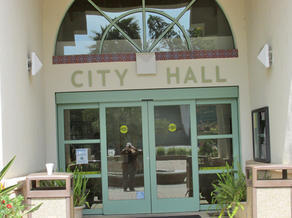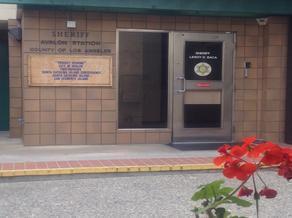Part two of two.
The following are highlights from the April 9 City Council meeting about a proposed agreement between the city of Avalon and the Catalina Island Conservancy. Space limits make it impossible to report everything said or everyone who spoke.
As reported last week, in the face of strong public opposition the council took no action on the proposal, essentially stopping it.
Background
The proposal, according to the city manager’s staff report, would have required changing the Municipal Code to allow the capture and sterilization of deer within city limits.
The deer would have had tags place in their ears and the Conservancy would let them live out their lives on the Island.
Under the proposal, a final on-ground deer hunting season would have taken place on the Island, with the Conservancy asking the state for more tags. The proposal would have had the Conservancy agree not to carry our aerial deer removal from June to September.
Discussion
A man named Daniel referred specifically to proposed changes to the Municipal Code related to the foxes. The foxes had been left out of the Municipal Code.
He opposed any change to the Municipal Code related to the deer. He also opposed a last hunt.
“I would rather save our town deer indefinitely,” Daniel said.
Councilmember Michal Ponce wanted to know what opponents’ bottom line was.
“Is it about the Conservancy or is it about the deer?”
“It is about the deer,” Daniel said.
He proposed city-appointed a third-party review corroborate the facts. He also proposed a manageable deer population.
“I agree with you,” Ponce said.
“But the argument is always we have to save all the deer,” Ponce said.
Daniel said what the council was giving to them was not a compromise.
Mayor Anni Marshall said people want to hunt.
“We don’t need to compromise. We already have the power to keep them in town indefinitely,” Daniel said.
“If this is passed, the CDFW has no reason to uphold our ordinance,” said Councilmember Lisa Lavelle.
“I don’t know if everyone is understanding that our ordinance may not stand if the CDFW approves their application,” Lavelle said. She was referring to the Conservancy’s permit application to eradicate the Island’s deer.
Lavelle said the deer in the city might eventual end up back in the Interior again and end up being killed without anyone being able to have a last hunt.
“I don’t think I’ve seen the Conservancy compromise on anything before,” Lavelle said.
“Why do we have to compromise when we already had it set in stone in November?” Daniel asked.
Pastor Lopez was another opponent of the proposal.
“I went to the Conservancy house and I told the lady that being a Vietnam veteran I know for a fact you’re not going to make a clean one-shot kill on a moving animal from a moving helicopter,” Lopez said.
“I was told I was wrong and that that was a humane way to eradicate those animals,” Lopez said.
“How would anyone like to be the very last deer of the dying-out tagged deer in Avalon wandering around lonely without your herd?” Lopez asked.
Wendy Hernandez of the Coalition to Save Catalina Island Deer said the Conservancy was the only winner with the proposal.
“Should the state ultimately grant the conservancy’s permit, arrangements for deer in town can be made at that time,” Hernandez said.
“There is absolutely no reason to act before the state has issued this permit. Also, any applicant for a scientific collection permit is required to get permission from the land owners and jurisdictions where they intend to conduct activities,” Hernandez said.
“You listened to your community and did the only thing that you had the authority to do in the situation: Protect the deer within the city limits and now you not only want to take that away from us but you are annoyed and upset with us for not embracing it,” Hernandez said.
Hernandez said this was a small town and she had heard that some members of the council were tired of the deer issue and wanted the issue to go away.
“Although I appreciate all of you and you’re all nice people I’ve known you forever and that is a totally different subject but, frankly, if you want to complain about 2,000 emails or you’re feeling overwhelmed with people reaching out and asking you to do your jobs then maybe you should resign and let someone else take the position that is willing to do what needs to be done,” Hernandez said.
Hernandez said the community was not invited to participate in the discussions between the city and the Conservancy.
According to Hernandez the public was only informed of the compromise on the Friday prior. She called for adequate time to research the issue.
Mayor Anni Marshall, apparently referring to a 2022 letter from the city of Avalon to Fish and Wildlife, said that according to then-City Manager Denise Radde, the only reason the city wrote that letter was because everyone was complaining about the deer in town. The deer were eating crops and people didn’t like seeing the starving deer. “So that’s what the original letter was intended and then the one that we wrote recently was in opposition of the permit, just to set the record straight,” Marshall said.
According to Marshall, the city recently wrote a letter in opposition to the permit application to eradicate the deer.
Caleb Lind said he opposed the complete eradication of the deer. “What I’m saying is the answer is not zero. We can truly manage the herd with real research and accurate numbers,” Lind said.
“Land can support a certain number of mouths feeding it,” Lind said.
“When there were pigs and goats, the deer weren’t as plentiful because the pigs and goats were eating some of the food once. Those are gone; now we have more deer,” Lind said..
“What’s going to eat all those seedlings and sprouts that the deer aren’t eating if we manage the population to a level that the island can healthily sustain? Everybody wins,” Lind said.
Lind said that the California Penal Code limited the Conservancy to only hunting on their property or on property, not his backyard.
Councilmember Lavelle said she was mentioning the fact that the deer will still come and go from the city and if they end up in the Interior, they could get killed.
Lind argued that not all of the deer would be killed.
Marshall said the city sent a letter to Fish and Wildlife strongly opposing the permit.
“For the property that they have control of,” Lind said.
Marshall asked what he wanted the council to do.
Lind did not like changing the current wildlife ordinance or approving the memorandum.
Diane Stone said the council listened to the residents of Avalon in November.
“You did yourselves proud, but do not be fooled by the pretty ribbon that the Conservancy has put on their old package,” Stone said.
“Their bottom line remains the same: the slaughter of all the island deer what is the Conservancy is offering. They say they won’t use net and bolt. Well, our city ordinance already made that obsolete because that’s how they were going to capture all the deer and kill the ones that were here in town,” Stone said.
“The final hunting season. Grand gesture. It’s a win-win for CIC. They kill a lot of deer and then they won’t have to pay White Buffalo quite so much in 2025,” Stone said.
“Spay and neuter is already in their plans to Fish and Wildlife. That’s their plan to do the Judas deer. The only difference now with this plan is that they wouldn’t be killed unless perhaps by collateral damage if they are in the Interior. The aerial hunting will still happen,” Stone said.
“I am surprised to hear that they are talking about this. Without this memorandum they would begin in June of this year; June to September, the height of our tourist time,” Stone said.
“You did the right thing by amending the city ordinance. Don’t back down now. The rights and the interests of the citizens of Avalon should come first. To date, Fish and Wildlife has not granted this permit. So why is the city in a hurry to have this memorandum of understanding? Be strong and do the right thing,” Stone said.
Bre Bussard was another opponent of the proposal.
“The Coalition and members of this community worked tirelessly to have the original amendment adjusted to include the deer and I thank the council for hearing us and for acting accordingly,” Bussard said.
“It’s crucial for the City Council to listen to the voices of its constituents and to remember the reasons why the original ordinance was approved,” Bussard said.
“It’s important to uphold the integrity of our community and to prioritize the welfare of our deer within city limits,” Bussard said.
“Remember that the Conservancy only has control and power over the Interior of the island and it is up to us to morally decide what happens within our city,” Bussard said.
She urged the council to vote against the proposal.
“I think that we need to have a more open dialogue and not in a setting that is just so last-minute, rushed, and in a place like this,” Bussard said.
Conservancy CEO Whitney Latorre supported the proposal. She updated the meeting on the Conservancy’s outreach efforts.
“What we’ve taken away from those conversations and the modifications we’ve discussed with the city that take those conversations into account while also fulfilling our mission of ensuring a healthy safe and accessible Island for generations to come,” Latorre said.
“Through nearly 100 one-on-one conversations with community members, a presentation at City Council, the formation of a local advisory board, a community forum with experts on Island restoration regionally, nationally, and globally, hundreds of questions submitted and answered on our website and our community meetings at the Trailhead over the past three months, we’ve been able to listen answer questions and explain the importance of the project,” Latorre said.
“We were also asked to revisit the potential methodologies, from shipping the deer off the Island to introducing a predator and experts agree that these options are either not feasible create more stress and harm for the deer or are simply ineffective,” Latorre said.
“However in working with the city to find common ground we believe there are ways to incorporate ground hunting and the sterilization of some deer to meet some of the community requests that have been made, as stated in the city manager’s report,” Latorre said.
Carri Denny questioned the Conservancy’s deer population count.
A dark haired woman, apparently Conservancy Senior Director of Conservation, Dr. Lauren Dennhardt said the Conservancy did spotlight surveys. She described it as driving a truck, shine a light, count the deer and then university scientists give a population estimate.
Peter Sharp said he had spent his career as a wildlife biologist. He was another supporter of the proposal.
“I have been involved with wildlife projects on all eight of the California Channel Islands over the past 27 plus years,” Sharp said.
“This work has afforded me the opportunity to experience the unique ecosystems found on each island to observe the negative impacts that non-native ungulates have had and to witness the recovery of animal and plant communities following ungulate removal,” Sharp said.
“I believe that the deer should be removed from the island for ecological reasons but also to reduce future animal suffering. Unlike the millions of mainland mule deer, Catalina’s deer cannot migrate during periods of food or water stress because they are essentially a captive population fenced in by the ocean,” Sharp said.
“As a result hundreds of deer died of starvation or dehydration during our recent prolonged drought and if the status quo was maintained thousands more likely to die over the coming decades as droughts are predicted to become more common and intense,” Sharp said.
City Manager David Maistros said he felt there was a desire to have a conversation and a desire to find some sort of middle ground.
According to Maistros, he was hearing a clear message that night that people did not want a compromise; they didn’t feel this was a sufficient compromise.
“At the end of the day it’s not our decision, it’s the CDFW’s decision,” Maistros said.
“Because we tried to get this because I felt like you, like many of you, I felt that the hunting season was an important part of this,” Maistros said.
Maistros said he hated to get bogged down where the council would be attacked for something he brought to them.
Maistros said he felt there was a desire to have a conversation and a desire to find some sort of middle ground.
Ponce said that he truly respected some of the people out there.
“You have made this body feel like they’re deer killers; that we want to kill the deer. Nobody on this dais wants a deer kill. Nobody on this dais wants helicopters in the air shooting deer,” Ponce said.
“You don’t like the compromise, that’s fine. Dave had his reasons for bringing this to us and it looks like we’re going to go and just let that go, but to treat my fellow council people the way they have been treated on social media—I don’t even go into the discussion page anymore,” Ponce said.
He said the opponents had done an amazing job of organizing.
“But are you really 90% of the community? That’s my big thing. I’ve heard from people who don’t really have an opinion on the deer,” Ponce said.
“I understand the passion, but we’re just trying to do what’s best,” Ponce said.
Marshall told Maistros the council was not going to provide any direction to staff.
Councilmember Mary Schickling said:
“Don’t do any action on this?”
Marshall confirmed that.
“I said at the outset of this meeting that I thought it was a good compromise,” Schickling said.
“But sitting here and listening to y’all I mean if you want to roll the dice right and you don’t want to have this, then I’m going to listen to you,” Schickling said.
Later, Councilmember Lavelle said she appreciated the Conservancy for bringing something to the council that was a consideration of the issues.
“I understand that people don’t want that and that’s fine and thank you for doing it anyway,” Lavelle said.
During the meeting, at least one of the speakers questioned whether the Conservancy could be trusted.
In response to an Islander request for comment, Conservancy Communications Direct Julie Benson wrote:
“Trust is at the core of our values at the Catalina Island Conservancy. We’ve been entrusted for over five decades to preserve Catalina Island’s ecological integrity and we stand fully committed to ensuring its enduring vitality and safety for future generations to enjoy and call home.”
The Islander also asked the Coalition to Save Catalina Island Deer for a comment on Councilmember Lavelle’s statement that Avalon’s ordinance against hunting or luring deer “might not stand if CDFW” approves the Conservancy’s application.
Melinda Benson, an attorney assisting the Coalition, wrote:
“It is the responsibility of the Avalon City Council to represent the citizens of Avalon and make policy decisions that serve their interests. When Council voted in November to strengthen an existing ordinance to protect animals within city limits, it was doing just that. We should never forget that, without consulting with the City of Avalon or its citizens, the Catalina Island Conservancy petitioned the State of California for authorization to engage in activities within city limits that would constitute extreme animal cruelty using methods and weapons that would pose a great threat to the health and welfare of all who live in or visit Avalon. This was a remarkable act of hubris even for the Conservancy. The CDFW cannot vest in the Conservancy the authority to engage in these activities. The Coalition does not dispute that the Department of Fish and Wildlife has jurisdiction over wildlife in the State of California, but nothing in the amended ordinance usurps that jurisdiction. Nothing prevents the CDFW from managing wildlife in Avalon consistent with its lawful charge and, even if it did, the CDFW is free to present that argument to the City and request a change. In addition, the City’s amended ordinance contains a strong severability clause that provides guidance in the event that any part of the code is found to violate state or federal law.”










